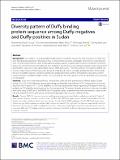Diversity pattern of Duffy binding protein sequence among Duffy-negatives and Duffy-positives in Sudan
Abstract
Background : Vivax malaria is a leading public health concern worldwide. Due to the high prevalence of Duffy-negative blood group population, Plasmodium vivax in Africa historically is less attributable and remains a neglected disease. The interaction between Duffy binding protein and its cognate receptor, Duffy antigen receptor for chemokine plays a key role in the invasion of red blood cells and serves as a novel vaccine candidate against P. vivax. However, the polymorphic nature of P. vivax Duffy binding protein (DBP), particularly N-terminal cysteine-rich region (PvDBPII), represents a major obstacle for the successful design of a DBP-based vaccine to enable global protection. In this study, the level of pvdbpII sequence variations, Duffy blood group genotypes, number of haplotypes circulating, and the natural selection at pvdbpII in Sudan isolates were analysed and the implication in terms of DBP-based vaccine design was discussed. Methods : Forty-two P. vivax-infected blood samples were collected from patients from different areas of Sudan during 2014-2016. For Duffy blood group genotyping, the fragment that indicates GATA-1 transcription factor binding site of the FY gene (- 33 T > C) was amplified by PCR and sequenced by direct sequencing. The region II flanking pvdbpII was PCR amplified and sequenced by direct sequencing. The genetic diversity and natural selection of pvdbpII were done using DnaSP ver 5.0 and MEGA ver 5.0 programs. Based on predominant, non-synonymous, single nucleotide polymorphisms (SNPs), prevalence of Sudanese haplotypes was assessed in global isolates. Results : Twenty SNPs (14 non-synonymous and 6 synonymous) were identified in pvdbpII among the 42 Sudan P. vivax isolates. Sequence analysis revealed that 11 different PvDBP haplotypes exist in Sudan P. vivax isolates and the region has evolved under positive selection. Among the identified PvDBP haplotypes five PvDBP haplotypes were shared among Duffy-negative as well as Duffy-positive individuals. The high selective pressure was mainly found on the known B cell epitopes (H3) of pvdbpII. Comparison of Sudanese haplotypes, based on 10 predominant non-synonymous SNPs with 10 malaria-endemic countries, demonstrated that Sudanese haplotypes were prevalent in most endemic countries. Conclusion : This is the first pvdbp genetic diversity study from an African country. Sudanese isolates display high haplotype diversity and the gene is under selective pressure. Haplotype analysis indicated that Sudanese haplotypes are a representative sample of the global population. However, studies with a large number of samples are needed. These findings would be valuable for the development of PvDBP-based malaria vaccine.
Citation
Hoque , M R , Elfaki , M M A , Ahmed , M A , Lee , S-K , Muh , F , Albsheer , M M A , Hamid , M M A & Han , E-T 2018 , ' Diversity pattern of Duffy binding protein sequence among Duffy-negatives and Duffy-positives in Sudan ' , Malaria Journal , vol. 17 , 297 . https://doi.org/10.1186/s12936-018-2425-z
Publication
Malaria Journal
Status
Peer reviewed
ISSN
1475-2875Type
Journal article
Collections
Items in the St Andrews Research Repository are protected by copyright, with all rights reserved, unless otherwise indicated.

